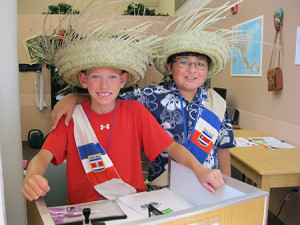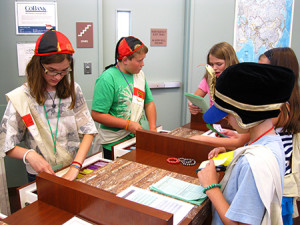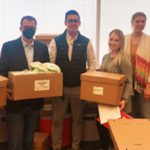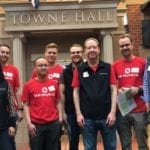Share This Article
Since starting as a program’s assistant I’ve spent most of my time in AmeriTowne, our program for 5th graders. Last week however was my first day running a world region on my own, PacAsia, which includes Australia, Japan, China and India. Singapore is in there too, but it serves as the “World Bank” and has its own staff person. International Towne is geared towards slightly older students and focuses on global trade and cultural awareness.
International Towne overview
The “world” is broken down into four regions: MidAfri, EurRussia, AmeriLat and of course, PacAsia. Each region has its own currency, forcing kids to take exchange rates into consideration. When travelling the world (each student has two breaks to travel the world and spend their salaries) the students are required to bring their passports with them, and in the afternoon those must include their passport photos, which are taken by citizens of Egypt every morning. Every country has a president, a finance minister and a customs agent, and additional workers depending on the size of the group. By the end of the day, the students must all have gotten their passports stamped by every country, granted only after greeting and thanking the customs agent in the local language.
Where in AmeriTowne shops sell a multitude of toys, in International Towne they sell Business Norms, which are short activities that teach specifics about how that country conducts business – the UK’s is about dry British humor while Japan’s is “the art of bowing – which they receive credit for doing back at school; Cultural Activities, which includes dot art in Australia and creating mandalas in India; a souvenir and/or a snack.
Important learnings
International Towne emphasizes the global reality of “interconnectedness” that we live in today. The opening ceremony, similar to the one we all just witnessed from Sochi, where the delegates emerge clad in sashes with their country’s flag and festive hats. They carry in flags and plumes and after introducing their countries the finance ministers participate in a trade simulation. Each nation both exports and imports a good. The receive money for their exported good, but are required to pay a tariff on it as well. When the day is wrapped up at closing ceremony the kids are told Nelson Mandela’s inspiring story and are given a post card with the quote “education is the most powerful weapon which you can use to change the world”. They are tasked with going home and coming up with a change they’d like to see in our world today.
Having grown up in Germany I was fortunate enough to be surrounded by cultural educational opportunities, and I’ve been so encouraged by the International Towne model and the effects it produces. Because when it comes down to it, we’re all ‘citizens of the world’.
Teacher’s Tip:
Have parent volunteers coming? Generally, they arrive 30 minutes prior to the students; if they’re complete, consider sending the shop folders and accountant’s checkbooks with a parent so that the staff can set the shops up in advance.




